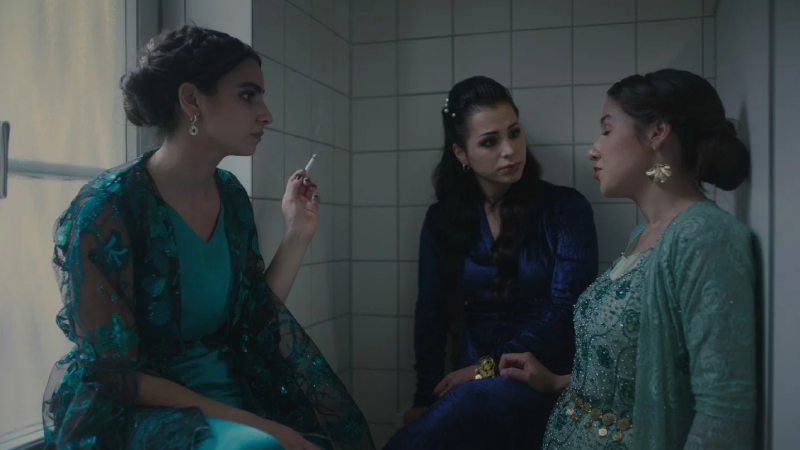




Twenty-something-year-old Elaha (Bayan Layla) is beautiful and cheerful. Her black pearly eyes are bursting with passion and the desire to live. The curvaceous body, including very large breasts that barely fit her clothes, are a constant reminder of her blossoming youth and sexuality. She is engaged to the tall and handsome Yusuf (Slavko Popadic). They look like the perfect young couple, and both of their families are indeed elated at the impending marriage. Yet there is something bothering Elaha: she is no longer a virgin. Such revelation during her nuptials could lead to immediate rejection by her husband and irreparably “shame” her very own family (“the damage done to the herd embarrasses the shepherd”).
Both families belong to a closely-knit Kurdish community somewhere in Germany. While they seem socially integrated and speak German most of the time (Kurdish is used only sporadically at home), they remain firmly loyal to the very conservative values that define their culture. “I would prefer if you were dead”, says Elaha’s mother (Derya Durmaz) in relation to the possibility that her daughter may no longer have her purity. So Elaha decides to perform a hymenoplasty (a reconsruction of her hymen) in secret., The procedure turns out to be very expensive (roughly €3,000) and with a long healing period (she must not have sex seven weeks after the operation). She tries to save the money, while also experimenting with over-the-counter fake hymen pills (a very unreliable device that spills fake blood), and attending counselling sections in the hope that social services will pay for her surgery.

Her fears and anxieties grow much stronger after Yusuf’s family (her in-laws-to-be) make a very bizarre request, sending a frantic Elaha on a mission to find a solution overnight. Parallel to this, she has to grapple with her social life, including the far more sexually liberated Beritan (Cansu Leyan). These movements raise suspicions with her fiancé, who is convinced that hanging out with young women her age must be synonymous with a licentious lifestyle. This too culminates in a very strange confrontation, as Yusuf uses his bare fingers in order to establish the degree of virtuousness between the legs of the hapless young woman.
Elaha is a very simple and straightforward movie about a young woman grappling with modern life and tradition. The bias is towards the former. The many people Elaha comes across outside the home (friends, social workers, etc) predictably encourage her to claim her body as she sees fit, and to confront the orthodoxies of her culture. There is a feminist message, even if it feels a little contrived and preachy. This is a European film with a European agenda. The sombre cinematography (with sparse artificial lighting), combined with a concrete social topic, provides the movie with a touch of realism, almost social realism, even if some stiff lines and bathetic music score partly hamper these efforts. On the other hand, it is very rare that the debut feature of an Armenian filmmaker based in Germany should reach UK movie theatres. Elaha merits a visit to the cinema.
The UK premiered of Elaha took place at the Glasgow Film festival. In cinemas on Friday, April 26th.






